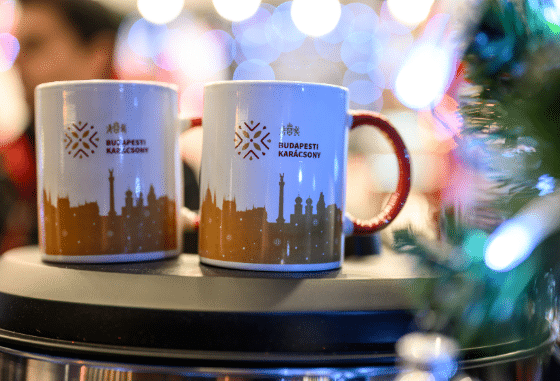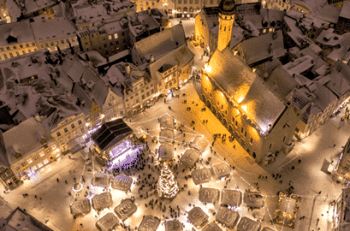If you want to enjoy a unique and unforgettable Christmas experience – and one that doesn’t (usually!) include snow and freezing cold temperatures – then the Budapest Christmas markets might be for you.
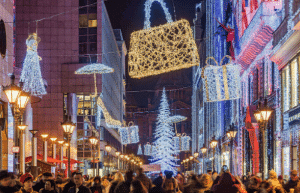 The vibrant capital of Hungary offers an excellent festive experience that blends nicely with the city’s rich history, thermal baths and lively atmosphere.
The vibrant capital of Hungary offers an excellent festive experience that blends nicely with the city’s rich history, thermal baths and lively atmosphere.
This is a city of two halves – Buda and Pest – with each sitting on either side of the river Danube.
The Christmas markets offer a unique blend of traditional Hungarian customs, lovely food (especially the cakes!) and a warm, welcoming atmosphere that attracts visitors from around the world.
Here, the Christmas.co.uk team offers this guide to the Christmas markets in Budapest and why, out of all the European Christmas markets, you should consider visiting.
When are the Budapest Christmas markets in 2024?
Budapest boasts several Christmas markets, each with its own distinct charm. The largest and most popular is the Christmas market at Vörösmarty Square, which is on the
Other notable markets include the Advent Feast at St Stephen’s Basilica, and we quite liked the Winter Festival at City Hall Park.
These markets typically run from mid-November to the end of December, offering a month-long celebration of festive cheer.
The markets are easy to get to on public transport and there are lots of cheap trams to use.
- Christmas Market at Vörösmarty Square: November 15 – December 31 2024
- Advent Feast at Saint Stephen’s Basilica: November 15 2024 – January 1 2025
Why visit the Christmas markets in Budapest?
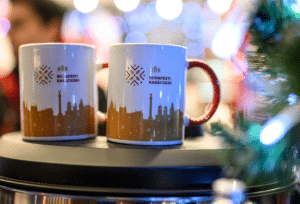 Set in a city that’s easy to get around, the Christmas markets in Budapest are certainly worth a visit.
Set in a city that’s easy to get around, the Christmas markets in Budapest are certainly worth a visit.
While the biggest and most popular market is at Vörösmarty Square the stage used for performances was removed in 2022 – that’s sad but this is still a busy market to visit.
Other reasons for making Budapest your choice of festive markets include:
- Festive treats: Warm your hands with a steaming mug of forralt bor (mulled wine), spiced with cinnamon, cloves and citrus. We’d also highly recommend Hungarian comfort food treats like kürtőskalács (chimney cakes), a sweet pastry dusted with cinnamon or cocoa, and langos, a deep-fried flatbread topped with savoury options like sour cream and cheese. Obviously, Hungarian goulash, a hearty stew perfect for a chilly day, will be on your to do list.
- Artisan treasures: Browse a dazzling array of handcrafted treasures such as unique wooden ornaments depicting Hungarian landmarks, hand-embroidered tablecloths, warm sheepskin mittens and intricately decorated gingerbread houses. You can also watch the skilled craftspeople showcasing their talents in lacemaking, leatherwork and pottery.
- Festive entertainment: There are lots of vibrant street performances that include local choirs performing traditional carols and Hungarian folk songs. The city also offers impressive ice sculptures on many streets.
But that’s not all – Budapest is a great city to visit around the year with attractions including:
- Széchenyi Thermal Bath: Indulge in a luxurious soak at the Széchenyi Thermal Bath, Europe’s largest thermal bath complex, featuring ornate neo-Renaissance architecture and various pools with healing waters. The historic bathhouse offers a unique opportunity to unwind in steaming hot water amidst stunning architecture. They are very popular and worth a visit – the main area is outside so the naturally warm waters will be more enjoyable! Don’t forget to take your swimming costumes!
- Danube River: Take a romantic cruise along the Danube River – the second longest river in Europe – and enjoy the breathtaking views of the city that is adorned with festive lights. This time of year, the Buda Castle is illuminated against the night sky.
- Cultural tapestry: Budapest boasts a rich cultural heritage and along with the Buda Castle (a UNESCO World Heritage Site), there’s also the Parliament Building and the Hungarian State Opera House – and all are decorated for the festivities.
oooOooo
Best 5 BUDAPEST CHRISTMAS MARKETS
The presenter, Stuffed Cabbage Adventures, is very enthusiastic and promises what the markets offer for food and drink and how much everything costs.
He starts by mentioning the Christmas markets that no one talks about compared with the big, popular ones.
Along with the big attractions at Saint Stephen’s Basilica and the Vörösmarty Square, there are other alternative markets.
Starting at Vörösmarty Square, visitors will be impressed with the simple idea of having souvenir stalls on one side of the square, and food shops on the other.
It’s worth noting that the presenter states that the food appears to be more expensive than the year before – but the Christmas.co.uk team found eating in Budapest to be a very cheap experience compared to the UK!
PRESENTER TIP: The big markets only use cards but be aware that they add a service charge. He says visitors must change this to zero per cent since they aren’t servers relying on tips.
There’s also a market at Városháza Park Ice Skating, a nostalgic market at Óbuda Old Town and an advent attraction at the market in Újpest.
Óbuda had lower prices and fewer people so was easier to get around.
The lesser-known markets, the presenter says, are mostly visited by locals but are still worth a visit by tourists.
He visits Ujpest advent market which is further out in the city and has a laid-back atmosphere. Again, the prices are cheaper.
The Christmas markets are a highlight in Budapest during the winter with unique experiences promised for visitors.
There’s mulled wine and lots of food from snacks to bigger dishes like goulash, lángos, pörkölt and stuffed cabbage.
There are lots of stylish souvenirs and overall, the video illustrates why Budapest is worth visiting for its Christmas markets.
oooOooo
The history of Budapest’s Christmas markets
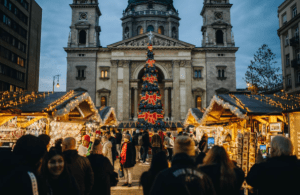 Budapest’s Christmas markets date from the 18th century and were originally established as a seasonal market for locals.
Budapest’s Christmas markets date from the 18th century and were originally established as a seasonal market for locals.
Over time, like many European Christmas markets, they have evolved into a major tourist attraction while retaining their warm and welcoming atmosphere.
The market stalls themselves hold historical significance with many passing down through generations, adding a touch of authenticity to the experience.
There are now more than 100 stalls to visit, selling everything from handmade local crafts to mouthwatering Hungarian specialities.
The markets really took off in the early 1990s, and now thousands of tourists head to the city to enjoy the festive atmosphere.
It’s worth noting too that the Christmas markets stand apart from rivals with their commitment to tradition and quality.
The main market is known for its strict quality control, with all products being handmade and locally sourced.
There’s also traditional Hungarian cuisine available at the market, such as nokedli dumplings, lángos and chimney cakes.
Tips to enjoy Budapest’s Christmas markets
To get the best from your visit, it’s worth planning what you want to do.
- Clothing: Budapest winters can be chilly, with temperatures hovering around freezing. Pack warm layers – thermals, a winter coat, hat, gloves, and sturdy boots with good grip are essential.
- Currency: Hungary uses the Hungarian Forint (HUF). Consider exchanging some currency beforehand or using a travel card. Many stalls accept debit and credit cards, but carrying some cash is recommended. Don’t worry, every stall shows prices in euros too.
- Souvenirs: Keep an eye out for unique Hungarian keepsakes including paprika, traditional folk dolls in vibrant costumes, or a beautifully hand-painted porcelain ornament depicting Budapest landmarks.
- Language: It’s always worthwhile learning a few phrases which will be appreciated by locals such as ‘Jó napot’ (Good day), ‘Kérem’ (Please), ‘Köszönöm’ (Thank you), ‘Elnézést’ (Excuse me), and ‘Mennyibe kerül?’ (How much does this cost?). We found that outside of the main tourist areas, not many people speak English but trying their language will break down barriers!
Other cities worth a visit include Szentendre, Visegrád and Esztergom and they are all within a short distance and offer unique cultural experiences.
Each of these cities hosts its own Christmas market, providing more opportunities to experience Hungarian holiday traditions.
Other Christmas markets to visit
If you want to visit another festive market, then consider these:
- Vienna Christmas market: Take a day trip to Vienna, Austria, and explore its renowned Christmas market at Rathausplatz, known for its elegant atmosphere and giant ice skating rink.
- Prague Christmas market: Immerse yourself in the fairytale atmosphere of Prague’s Old Town Square Christmas market, featuring a giant Christmas tree, nativity scenes and handcrafted ornaments.
oooOooo
Budapest Christmas Markets: 4K Walking Tour 2023
Here, World Traveler takes a walking tour to show how impressive Budapest’s Christmas markets are.
There’s even drone footage to highlight the city’s markets at Zrínyi Street and St Stephen’s Basilica, along with Deák Ferenc Street for the Christmas lights and the classic market at Vörösmarty.
There’s great footage of the food stalls and the range of souvenirs available.
For visitors with a sweet tooth, the range of cakes and strudels will impress.
The high-resolution video also highlights how bright and welcoming the markets are.
The visit to the Cathedral occurs when the cathedral bells are ringing.
There’s also a good selection of mulled wine stalls – though we were intrigued by the stall in front of the cathedral steps with a sign in English saying: ‘The most wonderful pint of the year’.
The street lights in ‘Fashion Street Budapest’ (Deák Ferenc Street) also impress.
We noticed too that Vörösmarty has places for people to sit and eat and drink.
For a good impression of what’s available in Budapest, then this video goes a long way to show how relaxed, bright and welcoming the markets are.
oooOooo
How to visit the Budapest Christmas markets
- Flying: There are lots of carriers offering direct flights from major UK airports to Budapest Ferenc Liszt International Airport (BUD). You can travel with KLM but there’s a stopover, so the nearly three-hour journey becomes between four and five hours. Skyscanner found lots of deals with prices starting at £115 from Manchester and £164 from London. Ryanair offers flights from Gatwick, Stanstead, Bournemouth (seasonal), Bristol and Birmingham. It also flies from Belfast and Edinburgh. Jet2 flies from Newcastle, Leeds, Manchester and Birmingham. British Airways offers a good service from Heathrow and it’s worth checking out low-cost carrier Wizz Air which flies from Gatwick, Luton, Liverpool and Glasgow. The travel platform Kayak offers a mix of easyJet and Ryanair from Gatwick or Stanstead for £140 and £155 return. The flights take around 2.5 hours.
- Trains: There’s a marvellous train station in the centre and lots of trains from big European cities. However, it takes nearly 21 hours to travel by train from London to Budapest – with tickets costing around £127. Travellers will also need to make three changes.
- Bus: The bus journey takes longer at around 31 hours (the quickest journey we found was 28 hours) and tickets cost from £29 to £77 – depending on the website you use.
Where to stay in Budapest
We found that Budapest offers travellers a great range of quality accommodation – we used Booking.com – at cheap prices.
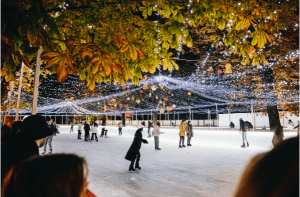 Budget options include Meinininger Budapest Great Market Hall which has dorm beds and private rooms from €30 per night. It’s close to the Christmas markets and the Great Hall market which makes for an interesting detour (there’s a great cafe on the top floor). The Budapest Panorama Central offers a clean, no-frills option from €40 per night and the B&B Hotel Budapest City has small rooms and is in a lively area. Expect to pay from €50 per night.
Budget options include Meinininger Budapest Great Market Hall which has dorm beds and private rooms from €30 per night. It’s close to the Christmas markets and the Great Hall market which makes for an interesting detour (there’s a great cafe on the top floor). The Budapest Panorama Central offers a clean, no-frills option from €40 per night and the B&B Hotel Budapest City has small rooms and is in a lively area. Expect to pay from €50 per night.
If you prefer mid-range hotels, then take a look at the Corinthia Hotel Budapest on the banks of the Danube River. Prices start from €150 per night and the four-star Anjou Hotel Budapest is in the heart of the city and costs from €120 per night. There’s also the Hotel Parlament in a historic building and close to the Hungarian Parliament Building with prices starting from €100 per night.
Budapest also offers luxury hotels such as the Four Seasons Gresham Palace Budapest with great views of the Chain Bridge and the Parliament – it costs from €300 per night. There’s also the Ritz-Carlton with rooms from €400 per night and the Boscolo Budapest Hotel is a grand hotel in the city’s most famous street and costs from €250 per night.
Airbnb offers a great alternative to hotels with some lovely places offering a local experience. From big apartments to rooms in historic buildings, expect to pay from €50 per night for a room and €100 for an apartment.
If you don’t know Budapest, look at accommodation in these areas for easy access to the markets:
- Belváros – this is the historic heart of the city with lots of popular tourist attractions, including the Buda Castle
- Pest side which tends to be livelier with more restaurants and bars. Buda Castle district offers historic buildings, cobblestone squares
- There’s also the Jewish Quarter with its rich history and several synagogues, plus ‘ruin’ pubs that are busy and fun to drink in (we think!).
Also, before signing up for an Airbnb, always check the reviews and the local buses and trams – though you can walk around most of Budapest’s centre.
Budgeting for your Christmas market trip
Budapest is a great choice for a Christmas market trip in 2024. Here’s a breakdown of the costs to help you budget:
- Food and drink: Traditional Hungarian food at the Christmas market stalls: €3-€6 per item (sausages, langos, soups), chimney cake (kürtőskalács): €3-€5 (well worth the money!), hot drinks like mulled wine (forralt bor) or hot chocolate: €2-€4, beer is between €2 and €4.
- Accommodation: Budapest offers a variety of accommodation options, from budget-friendly hostels to luxury hotels. Here’s a general guideline: hostel dorm bed: €15-€30 per night, budget hotel room: €40-€70 per night, mid-range hotel room: €70-€120 per night, luxury hotel room: €120+ per night.
- Transport: Budapest has a good public transport system consisting of metros, trams, and buses. Tickets are affordable with a single ticket costing €1.50 (valid for 60 minutes with transfers). It’s using the Budapest travel card which€6.50 for 24 hours and €16 for 72 hours.
- Taxis: That’s mainly down to the regulated prices – there is no Uber because it was banned in 2016 but there is Bolt and Taxify – an Estonian alternative that can be used.
- Souvenirs and gifts: For those unique Hungarian souvenirs and gifts, expect to pay: handmade ornaments: €5-€10; paprika spice: €3-€5; embroidery crafts: €10-€20; bottles of Hungarian wine: €5-€20.
- Other Costs: Entrance fees to attractions will vary depending on the attraction, but most are under €10. The thermal baths are a must on your visit and cost €15-€25 (but take some slippers or buy them there).
You should really expect to budget €50-€70 per day on a budget-friendly trip, for mid-range trip €70-€100 per day and for a luxurious stay then €100+ per day.
Here are some tips to save money on your trip:
- Book your accommodation in advance, especially if you’re travelling during the peak Christmas market season (late November to December).
- Take advantage of the Budapest Card mentioned above which gives you free public transport, free or discounted entry to many attractions, and other discounts.
- Pack some snacks and drinks for your trip to save money on eating out all the time – difficult when visiting the markets.
- Look for free events and activities happening around the Christmas markets.
- Consider flying into a nearby airport, such as Bratislava in Slovakia, which can sometimes be cheaper than flying directly into Budapest.
Visit the Christmas markets in Budapest
Budapest’s Christmas markets offer a captivating blend of festive cheer, cultural richness and thermal bath relaxation.
The city offers a great escape from the ordinary so you can embrace the extraordinary at this European Christmas market.
With its enchanting atmosphere, tasty Hungarian cuisine and fascinating attractions, Budapest promises an unforgettable winter wonderland experience.

